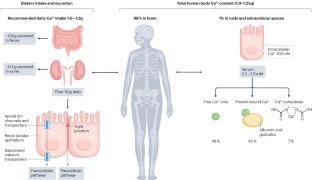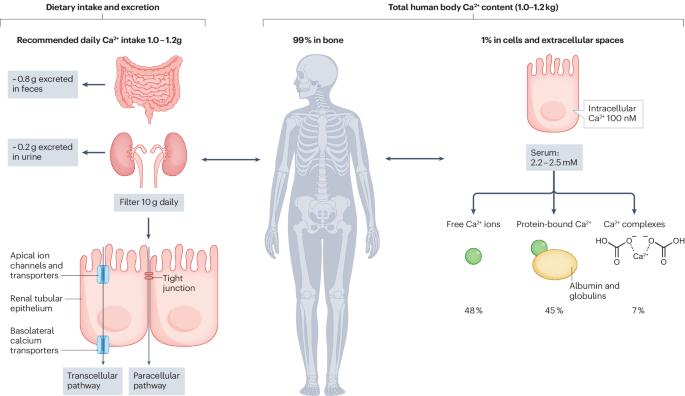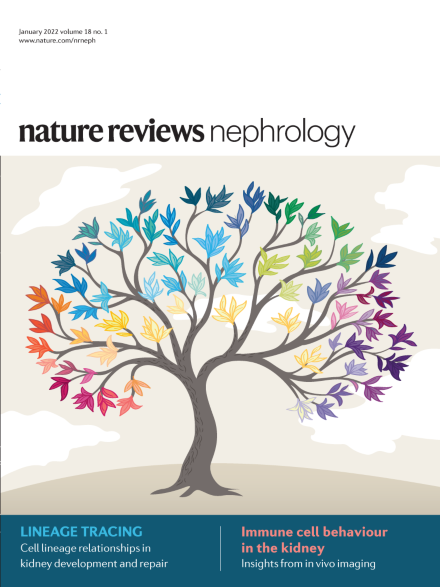Calcium signalling and transport in the kidney
IF 28.6
1区 医学
Q1 UROLOGY & NEPHROLOGY
引用次数: 0
Abstract
The kidney plays a pivotal role in regulating calcium levels within the body. Approximately 98% of the filtered calcium is reabsorbed in the nephron, and this process is tightly controlled to maintain calcium homeostasis, which is required to facilitate optimal bone mineralization, preserve serum calcium levels within a narrow range, and support intracellular signalling mechanisms. The maintenance of these functions is attributed to a delicate balance achieved by various calcium channels, transporters, and calcium-binding proteins in renal cells. Perturbation of this balance due to deficiency or dysfunction of calcium channels and calcium-binding proteins can lead to severe complications. For example, polycystic kidney disease is linked to aberrant calcium transport and signalling. Furthermore, dysregulation of calcium levels can promote the formation of kidney stones. This Review provides an updated description of the key aspects of calcium handling in the kidney, focusing on the function of various calcium channels and the physiological stimuli that control these channels or are communicated through them. A discussion of the role of calcium as an intracellular second messenger and the pathophysiology of renal calcium dysregulation, as well as a summary of gaps in knowledge and future prospects, are also included. Calcium reabsorption along the nephron is essential for calcium homeostasis and whole-body electrolyte balance. Here, Staruschenko et al. highlight signalling pathways and molecules involved in renal calcium handling in health and disease, and discuss progress in the integration of systems-level and molecular understanding of calcium transport and regulation.


肾脏中的钙信号和转运
肾脏在调节体内钙含量方面起着关键作用。过滤后的钙约有 98% 在肾小球中被重吸收,这一过程受到严格控制,以维持钙的平衡,而钙的平衡是促进最佳骨矿化、将血清钙水平保持在较小范围内以及支持细胞内信号机制所必需的。这些功能的维持归功于肾细胞中各种钙通道、转运体和钙结合蛋白实现的微妙平衡。由于钙通道和钙结合蛋白缺乏或功能障碍而导致的平衡失调会引发严重的并发症。例如,多囊肾就与钙的异常转运和信号传导有关。此外,钙水平失调会促进肾结石的形成。本综述对肾脏中钙处理的关键方面进行了最新描述,重点是各种钙通道的功能以及控制这些通道或通过它们传递信息的生理刺激。本综述还讨论了钙作为细胞内第二信使的作用和肾脏钙失调的病理生理学,并总结了知识差距和未来展望。
本文章由计算机程序翻译,如有差异,请以英文原文为准。
求助全文
约1分钟内获得全文
求助全文
来源期刊

Nature Reviews Nephrology
医学-泌尿学与肾脏学
CiteScore
39.00
自引率
1.20%
发文量
127
审稿时长
6-12 weeks
期刊介绍:
Nature Reviews Nephrology aims to be the premier source of reviews and commentaries for the scientific communities it serves.
It strives to publish authoritative, accessible articles.
Articles are enhanced with clearly understandable figures, tables, and other display items.
Nature Reviews Nephrology publishes Research Highlights, News & Views, Comments, Reviews, Perspectives, and Consensus Statements.
The content is relevant to nephrologists and basic science researchers.
The broad scope of the journal ensures that the work reaches the widest possible audience.
 求助内容:
求助内容: 应助结果提醒方式:
应助结果提醒方式:


